#board of inspectors of prisons
Explore tagged Tumblr posts
Text
Women in prison are resorting to self-harm because of “astonishing gaps” in basic services including strict time limits when contacting their children and bans from using washing machines for dirty underwear, according to a watchdog’s report.
A survey of women in prisons in England found that “the frustrations of day-to-day life” and a “lack of basic care” were driving many to hurt themselves.
Women offenders were struggling to keep in touch with loved ones with a third receiving no face to face visits at all, a report released by HM Inspector of Prisons said.
A “basic lack of decency” compounded these challenges, inspectors found. Women were given ill-fitting prison-issue men’s clothes, while “a bizarre rule” prevented them from laundering underwear in a washing machine.
Charlie Taylor, the chief inspector, said: “Disappointingly, this report highlights a lack of basic care to help women cope day by day which, for some, is then a cause of self-harm.”
There are more than 3,600 female prisoners in England, held in 12 prisons. More than half have children under the age of 18.
In three of the four prisons surveyed, about a third of the women were more than 50 miles from home and at one of the sites it was over half of women.
None of the prisons provided transport to and from nearby train or bus stations. Inspectors said that the prisoners’ families were often unable to afford expensive taxi fares to get to the prisons and often attended “short, inflexible” visit sessions.
Secure video calls were available at all four sites, but the women were often frustrated by a limit of one call a month.
“The calls were not being used creatively to support women, for example in enabling them to read a bedtime story to their child, or to facilitate attendance at parents’ evenings,” the report said.
It found 84% of women felt unable to cope at some point in prison, and that the needs of women in prison exceeded the capabilities of prison staff and their environment.
None of the prisons allowed women to wash their underwear in a washing machine and instead they had to wash it by hand in a small bowl in their cell, a policy not found in men’s prisons.
One offender told the inspectors: “I wash all my socks and underwear in the same bowl, but you only get one bowl and on a weekend, you get your razor. So, you got to do everything [referring to shaving, washing up and cleaning underwear] in that same bowl … its unhygienic.”
Another woman described arriving with only one pair of knickers. She was forced to hand wash them every night for months as no spare pairs were available, the report said.
Women, in particular those remanded into custody, often arrived with few belongings and relied on what the prison could provide.
In one prison there was no footwear available in sizes four to six, the most common sizes for women, the report continued.
“It was astonishing to find that most sites were not issuing prison clothing designed for women,” inspectors said.
Across women’s prisons, the self-harm rate is 5,785 incidents per 1,000 prisoners, which was more than eight times higher than in men’s prisons – 664 incidents per 1,000 prisoners.
In an interview with the Guardian last month, the prisons minister, Lord Timpson, said the government planned to reverse the increase in the number of women being sent to jail. Instead, hundreds of female offenders could be tagged and sent to addiction and rehabilitation centres, he said.
Shabana Mahmood, the justice secretary, said the report was “shocking” and “a wake-up call” for her department.
“We must do things differently which is why – as part of our Plan for Change to make our streets safer – we have launched a new women’s justice board to reduce the number of women in prison, and better support those who must still be imprisoned.”
268 notes
·
View notes
Text

Tarot Cards as Professions

Navigation: Masterlist✦Ask Rules✦Feedback Tips
Askbox✦Sources✦Paid Readings

Major Arcanas:
The Fool: Work with abroad, connections with imports, language teacher, multinationals, entrepreneur, intern, college student, art major.
The Magician: Entrepreneur, job that needs skill with the hands (acupuncture, hairdresser, artisan), actor, salesperson, influencer.
The High Priestess: Education, especially children, nutrition, psychology, cook, housewife, food engineering, toy factory, fortuneteller, spiritual advisor, librarian.
The Empress: Management, business administration, foreign trade, secretariat, translation, decoration, stay-at-home mom, model, cook, farmer.
The Emperor: Business administration, work related to areas of technological innovation, the military or sportsmen, CEO, tycoon.
The Hierophant: Philanthropic areas, ONGs, religious work, social work, diplomacy, and a degree, journalism, writer, editor, priest, spiritual guru, politician.
The Lovers: Sales area in any sector, tourism, theater, advertising, the arts in general, porn star, stripper, masseuse.
The Chariot: Activities related to transport, cars, the latest technology, chauffeur, mechanic, athlete.
Strength: Aesthetics, physical education and various body therapies, medicine, zoologist.
The Hermit: Teacher, writer, doctor, antique dealer, restorer, librarian, gardener.
Wheel of Fortune: Financial market, exchange offices, casinos, lottery houses, stock exchanges, and areas related to public relations, hospitality, game show host.
Justice: Public jobs, won through competitions, politics, police, with government positions, in the diplomatic area, law, insurance company worker.
The Hanged Man: Nurse, auditor, inspector, porter, secretariat, general assistants, yoga instructor, prison guard, philanthropist.
Death: Doctor, farmer, geologist, business administrator, gardener, accountant, assassin, death row executioner, surgeon.
Temperance: Working with liquids in general or with what is transported in liquid form such as alcoholic beverages, medicines, juices. chemist, chef, food critic, regional or even international traffic.
The Devil: Does not limit the individual to a professional wing, so he can also go to extremes for the desire he has, such as landlord, drug lord, sex trafficker.
The Tower: Social assistance, humanitarian aid, medicine, firefighter, police officer, construction worker.
The Star: Music, painting, sculpture, poetry, cinema, makeup artist, dressmaker, beautician, agent, promoter, sound artist, astronomer, harpist, dealer, meteorologist.
The Moon: Oceanographers, sailors, fishermen, owners of bars and restaurants or nightclubs, artists in general, medium, hypnotist, psychiatrist.
The Sun: Motivational speaker, entertainer, comedian, social relationships, work with the public, artist in general, member of society.
Judgment: Work done at home, connection with the law, lawyer, judge, work with disabled or people excluded from society, social assistance, board member, executive producer, director.
The World: Pharmacist, massage therapist, scientist, teacher, community leader, religious leader or priest, fashion designer, makeup artist, interior decorator.

Wands:
Creative industries such as advertising, marketing, and graphic design.
Entrepreneurship and starting your own business.
Athletics, sports coaching, or physical training.
Outdoor jobs like park ranger or tour guide.
Event planning or organizing.
Firefighters or rescue workers.
Ace of Wands: Entrepreneur, startup founder, motivational speaker, fitness coach, personal trainer.
Two of Wands: Business strategist, project manager, travel agent, international consultant, import/export specialist.
Three of Wands: Sales representative, marketing manager, e-commerce entrepreneur, market researcher, international trade coordinator.
Four of Wands: Event planner, wedding coordinator, party organizer, festival manager, hospitality industry professional.
Five of Wands: Conflict resolution specialist, mediator, lawyer, debate coach, competitive sports coach.
Six of Wands: Public relations manager, spokesperson, social media influencer, motivational speaker, winning athlete.
Seven of Wands: Defense attorney, human rights activist, political campaigner, advocate, civil liberties lawyer.
Eight of Wands: Courier, delivery driver, airline pilot, travel blogger, expedition guide.
Nine of Wands: Security guard, bodyguard, soldier, endurance athlete, self-defense instructor.
Ten of Wands: Overworked entrepreneur, project manager, event organizer, professional organizer, heavy equipment operator.
Page of Wands: Assistant in a creative field, aspiring artist, intern in a startup, social media coordinator, apprentice.
Knight of Wands: Travel journalist, adventure tour guide, professional athlete, race car driver, stunt performer.
Queen of Wands: CEO, business owner, charismatic leader, life coach, influential speaker.
King of Wands: Executive manager, entrepreneur, leadership coach, consultant, director of a creative agency.

Cups:
Counseling, therapy, or social work.
Hospitality industry, including restaurant management and bartending.
Wedding planner or event coordinator.
Artistic fields like poetry, writing, or acting.
Healing professions such as nursing or holistic therapy.
Psychologist or counselor specializing in emotions and relationships.
Ace of Cups: Therapist, counselor, social worker, holistic healer, emotional support specialist.
Two of Cups: Marriage counselor, matchmaker, relationship coach, wedding planner, love psychic.
Three of Cups: Event organizer, party planner, celebratory event coordinator, community organizer.
Four of Cups: Meditation teacher, mindfulness coach, spiritual counselor, psychologist, therapist.
Five of Cups: Grief counselor, trauma therapist, hospice worker, emotional healing practitioner, bereavement support.
Six of Cups: Child psychologist, teacher, daycare worker, children's book author, pediatric nurse.
Seven of Cups: Creative writer, fantasy novelist, imaginative artist, dream analyst, visionary.
Eight of Cups: Travel blogger, adventure seeker, spiritual pilgrim, explorer, wanderlust photographer.
Nine of Cups: Life coach, happiness consultant, gratitude coach, self-help author, wellness retreat organizer.
Ten of Cups: Family therapist, marriage and family counselor, foster care advocate, wedding planner, family mediator.
Page of Cups: Creative writer, artist in training, intuitive healer, aspiring therapist, dream interpreter.
Knight of Cups: Actor, romantic poet, musician, art therapist, love and relationship coach.
Queen of Cups: Psychic reader, intuitive healer, counselor, compassionate caregiver, therapist.
King of Cups: Therapist, counselor, intuitive mentor, emotional intelligence trainer, psychologist.

Swords:
Legal professions like lawyers, judges, or law enforcement officers.
Journalists, reporters, or investigators.
IT specialists, computer programmers, or hackers.
Teachers or professors specializing in critical thinking or philosophy.
Military or defense-related careers.
Strategic planners or analysts.
Ace of Swords: Lawyer, judge, legal consultant, investigative journalist, strategic planner.
Two of Swords: Mediator, conflict resolution specialist, negotiator, diplomat, relationship counselor.
Three of Swords: Divorce lawyer, grief counselor, trauma therapist, emotional healer, heart surgeon.
Four of Swords: Rest and relaxation specialist, meditation teacher, spiritual retreat organizer, yoga instructor.
Five of Swords: Military strategist, competitive sports coach, lawyer specializing in litigation, debate coach.
Six of Swords: Travel agent, relocation consultant, therapist specializing in transitions, boat captain.
Seven of Swords: Private investigator, spy, intelligence analyst, cybersecurity expert, undercover agent.
Eight of Swords: Social justice lawyer, human rights advocate, disability rights activist, therapist specializing in limiting beliefs.
Nine of Swords: Insomnia specialist, anxiety therapist, nightmare counselor, sleep coach, mental health counselor.
Ten of Swords: Surgeon, coroner, forensic scientist, mortician, grief counselor.
Page of Swords: Researcher, journalist, fact-checker, apprentice in a legal field, investigative reporter.
Knight of Swords: Military officer, police officer, attorney, competitive fencer, conflict resolution specialist.
Queen of Swords: Judge, lawyer, critic, journalist, literary agent.
King of Swords: Judge, attorney, CEO, strategist, military general.

Pentacles:
Financial advisors or investment bankers.
Real estate agents or property developers.
Agriculture, farming, or gardening.
Architects, builders, or construction workers.
Conservationists or environmentalists.
Accountants or bookkeepers.
Ace of Pentacles: Financial advisor, investment banker, wealth manager, entrepreneur, luxury goods retailer.
Two of Pentacles: Financial analyst, accountant, bookkeeper, event planner, stock trader.
Three of Pentacles: Architect, contractor, project manager, teamwork facilitator, craftsman.
Four of Pentacles: Wealth manager, investor, financial planner, asset protection specialist, treasurer.
Five of Pentacles: Social worker, philanthropist, charity organizer, financial counselor, volunteer.
Six of Pentacles: Philanthropist, humanitarian worker, non-profit manager, social worker, charitable fundraiser.
Seven of Pentacles: Gardener, farmer, agricultural consultant, sustainability expert, botanist.
Eight of Pentacles: Craftsperson, artisan, apprentice, skilled tradesperson, technical trainer.
Nine of Pentacles: Luxury brand manager, independent business owner, successful entrepreneur, vineyard owner, art collector.
Ten of Pentacles: Real estate developer, property investor, family business owner, generational wealth manager, financial advisor.
Page of Pentacles: Intern, student, apprentice in a practical field, aspiring entrepreneur, entry-level employee.
Knight of Pentacles: Accountant, financial planner, farmer, skilled tradesperson, meticulous worker.
Queen of Pentacles: CEO, business owner, property developer, hospitality industry entrepreneur, financial advisor.
King of Pentacles: CEO, business mogul, successful investor, high-level executive, financial consultant.
(CC) AstroJulia Some Rights Reserved

#tarot#tarot tips#tarot meanings#divination#cards#witch#witchcraft#witchblr#astroblr#career#astrojulia#all about tarot#tarot witch#major arcana#minor arcana#tarot and career
995 notes
·
View notes
Text

Yorkville Enquirer, 4 February 1903
M. Moreau-Christophe, the inspector of prisons under the second empire, knew the man who served as the prototype of Jean Valjean, and whose history haunted the brain of Victor Hugo and inspired his famous "Miserables." M. Moreau-Christophe had a passion for reforming convicts. He gathered many confessions, and knew many strange secrets. The following story of the convict Urbain Lemelle is taken from his notes:
"Urbain Lemelle, like Jean Valjean, was the abandoned child of a drunken father. When he was only 8 years old he went from farm to farm to offer for a piece of bread the work that his little hands could do. He was first taken in hand by a kind-hearted peasant named Brisset, who kept him minding cows for three years. Then he was employed by two neighboring farmers, who sent him to tend sheep for three years more. Urbain tired of the life of a shepherd and determined to become a sailor, when he reached the age of 14. He began as cabin boy in a river boat from Angers, whose captain generally spoke to him with the end of a rope. Three years passed in this way, during which Urbain's only consolation was in his friendship for the son of the captain, a young man named Gervais, who was no less badly treated than himself. This friendship was unfortunate for Urbain. One winter's day, when the waters of the Loire were frozen and navigation was suspended, Gervais proposed to Urbain to take away the money that was in the safe of the boat for the pay of the hands.
"Then," said he, "we will go to Nantes where we will become real sailors."
"But that is robbery you propose to me!" said Urbain.
"Robbery, nonsense!" replied Gervais. "Doesn't my father owe you 80 francs? Well, you can pav yourself the 80 francs out of the sack, and then you will be square."
An hour afterward the money was no longer on board the boat. Gervais had taken it away, and Urbain had hid it in the trunk of a willow tree.
Next day the imprint of his feet upon the snow led to the tree, where the treasure was found. Urbain was arrested, and the lock of the safe having been broken, he was condemned to seven years penal servitude. He was then only 17.
During his seven years' imprisonment, Urbain was resigned, industrious, religious and exemplary in his conduct. When he left the penitentiary, where he had lost seven years, he thought he had nothing to do but to return to Angers purified completely. It was at Angers that he committed his crime, and he wanted to prove that he was reformed. This hope was dissipated. The fact that he was an ex-convict closed all doors and all hearts on him. He found it extremely difficult to get work, and when, by chance he did procure some arduous employment, the other workmen refused to associate with him. He was condemned to idleness, beggary, and theft.
One Sunday, while roaming through the country he stopped, fatigued, to rest himself in a field where there were some horses at liberty. He thought of the sea that was only thirty leagues from him, and of America, that new world where he expected to live as an honest workingman. The idea turned his head. He jumped like a mad man upon one of the horses and started the animal along the road, without a saddle or bridle. He set out in the evening and arrived at the break of day at Ingrandes. Nearing that place on the edge of the road there was a prairie. There he turned loose the horse and entered the town.
An unknown person turning a horse loose was suspected. He was followed, arrested and brought before the mayor. He gave his name without hesitation, but while they were discussing his case, he managed to escape. He reached Nantes and tried to ship with some captain on a long voyage. But to embark, it was necessary to have papers, and Urbain didn't have them.
For some time he wandered along the quays almost on the verge of suicide, when a big hand touched his shoulder, the hand of a boatman of Angers, who recognized him. The boatman wanted help, so Urbain went with him to Angers. He had hardly arrived before he was arrested and put in prison on the complaint of stealing a horse. Now, it happened that the honest peasant Brisset, was the owner of the horse in question. He testified before the court that his horse came back to him and that Urbain was too honest a fellow to want to steal it. But he pleaded for him in vain. The unfortunate young man was convicted a second time by the Assizes court of Maine-et-Loire to twelve years' penal servitude.
At Brest he served his time just as he did formerly at Toulon. In prison his conduct was irreproachable, but after four years of tortures inflicted upon him in that dreadful place, he escaped. Where was he to go? Paris was the only place that could hide him from the police. He went there without encountering any difficulties, and the very next day after his arrival he was on the Place de Greve among the laboring men. There he was taken by a building contractor, with whom he remained for three years, whose regrets followed him to the establishment of M. Masse, a dry goods manufacturer, where he received better wages.
For four years M. Masse kept him and entrusted to his hands large sums of money, which Urbain always handled with zeal and intelligence and perfect honesty. He commenced to prosper and married an honest working girl. Happy in the thought that at last he was loved and respected, he lived with her for seven years.
One Sunday while he was walking in the suburbs with his wife, he met a policeman who was a former convict, who knew him at Brest. This policeman destroyed his entire happiness. He arrested him. Urbain was brought to Bicetre, and from there was taken to Brest to finish the eight years of penal servitude that he had still to serve, in addition to the supplementary years for the crime of escaping.
It was during the few months of his detention at Bicetre, in 1833, that Moreau-Christophe knew Urbain and learned his story. M. Moreau-Christophe obtained for him the favor of exemption from the first chain gang, on leaving Bicetre for Brest; and a few months later he managed to send him back to Paris. In other words, he brought the case to the attention of the king, who pardoned the man upon the spot.
Urbain Lemelle lived to a great old age. He was the best of husbands, and wished to be the best of fathers, but that joy was denied him. He consoled himself, nevertheless, by making pets of all the children in the place where he lived, and he amused them often by telling them stories of brigands. Heaven only knows what queer stories he must have learned during his ten years in the Bagne.
------
This story was published as early as 1900 and was printed verbatim in the 1919 book The Paris of Novelists, along with the claim that it inspired the character of Jean Valjean. And a newspaper article from that same year repeats the same story as well but calls the man "Urbian Lemerre." But in Moreau-Christophe's 1863 book Le Monde Des Coquins although he does tell the story of Urbain Lemelle, he does not make a connection between it and Valjean. He does however mention a gang leader nicknamed "Monsieur Madeleine" and suggests that it might have inspired Victor Hugo to use the name as well.
16 notes
·
View notes
Text
June 15, 1904
Today is the 120th anniversary of the General Slocum disaster in New York City’s East River.
120 years ago today, 1,358 passengers - mostly women and children - boarded the paddleboat steamship, hoping to enjoy the beautiful summer sunshine.
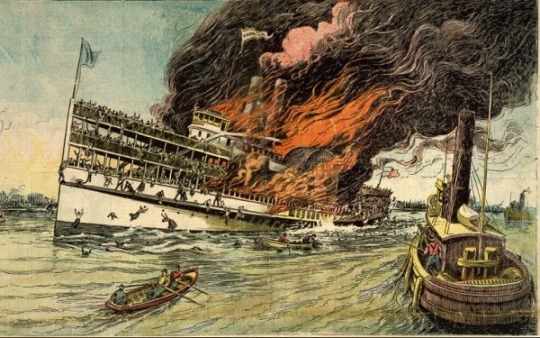
The General Slocum was built in 1891, and owned by the Knickerbocker Steamship Company. Just a month before the disaster, a fire inspector had deemed its fire equipment to be in “fine working order.”
When the fire broke out, the rotten fire hoses burst when filled with water. The dilapidated life preservers crumbled when seized by panicked hands. Life boats were bolted to the ship’s floor.
As the flames spread, hundreds of passengers jumped - or threw their children - overboard, only to drown. Countless others perished within the flames.
From the shore of Manhattan, hundreds of helpless onlookers could only watch. One newspaper described it as “a spectacle of horror beyond words to express—a great vessel all in flames, sweeping forward in the sunlight, within sight of the crowded city, while her helpless, screaming hundreds were roasted alive or swallowed up in waves.”
Finally the captain beached the burning wreck on the shores of North Brother Island - where patients with typhoid and other contagious diseases had been quarantined. Hospital staff swam to the burning boat, pulling dozens of victims to safety. Nurses threw debris for passengers to cling to while others tossed ropes and life preservers.
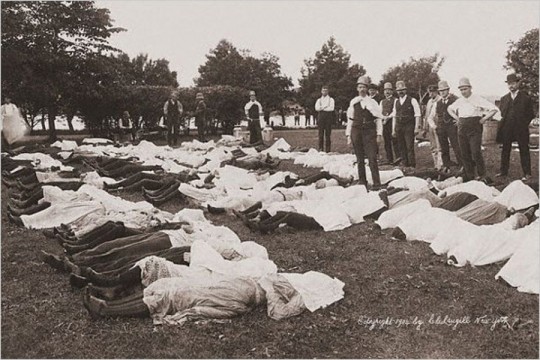
The death toll of 1,021, most of them women and children, made the burning of the Slocum New York City’s worst disaster until the attack on the World Trade Center on September 11, 2001.
Only the captain would ever face criminal charges for his ship’s unpreparedness. He was sentenced to 10 years in prison; he served four when he was pardoned by President William Howard Taft on Christmas Day, 1912.
The aftermath of the Slocum disaster was incalculable on New York City. The men of Kleindeutschland were left without families. Many returned to Germany, or moved uptown to Yorkville. Before long, the neighborhood changed completely - and became the mostly Russian, Polish, and Ukrainian neighborhood that it remains today.
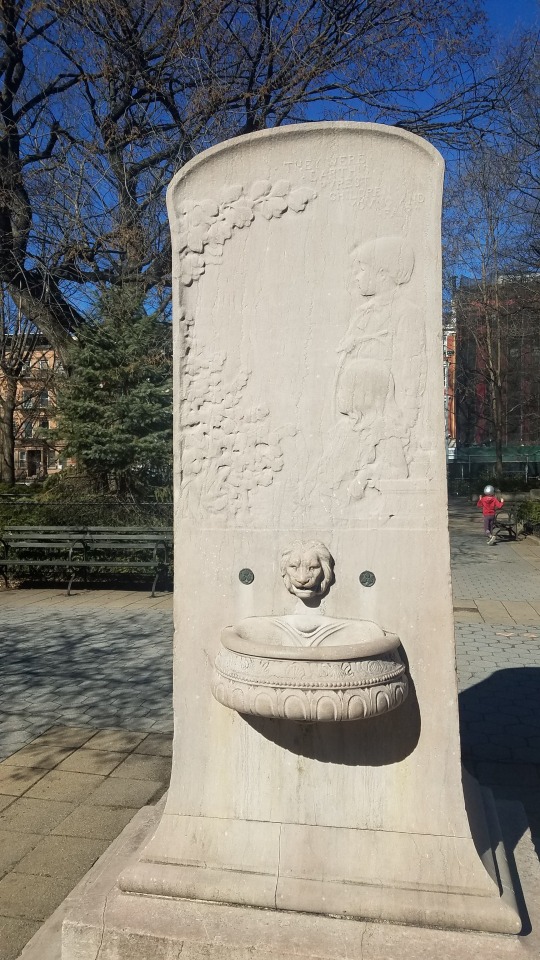
Please take a moment today and join me in a prayer for the souls of those lost, 120 years ago.
Thank you for helping them be remembered.
41 notes
·
View notes
Text
Pardon me for not shedding tears over the death of the misogynistic theocratic thug Ebrahim Raisi.
As a strong supporter of Ukraine, I note that Iran under Raisi has supplied Russia with Shahed drones which have murdered or maimed thousands of Ukrainians.
Of course Raisi, first and foremost, has repressed and killed countless Iranians over the span of his brutal career.
Iran’s hardline President Ebrahim Raisi — once seen as a potential successor to 85-year-old Supreme Leader Ayatollah Ali Khamenei — died after his helicopter crashed into trees in a mountainous northwestern region of the Islamic Republic on Sunday. The Iranian branch of the Red Crescent humanitarian network said on Monday its search and rescue teams had reached the crash site and “found no signs of the helicopter’s occupants being alive.” The discovery of the burned-out wreckage of Raisi’s helicopter among blackened trees — with seemingly only the tail surviving the crash — followed hours of searches in the fog-bound mountain valleys of Dizmar forest near the border with Azerbaijan. [ ... ] Raisi, 63, was a conservative cleric and former judiciary chief who was responsible for decades of vicious crackdowns against his own people’s aspirations for greater personal freedoms and democracy, arresting, torturing and executing tens of thousands of the Islamist regime’s opponents. Educated in the seminary city of Qom and dubbed “the butcher,” he was alleged to have been involved in the execution of thousands of political prisoners in the late 1980s, according to Iran’s opposition. As judiciary chief, he was also directly responsible for the wave of arrests and executions that followed massive anti-regime protests in 2019-2020. As president, he oversaw the iron-fisted repression of the “Women, Life, Freedom” movement that followed the death of 22-year-old Mahsa Amini. Tens of thousands were arrested, and the death toll is estimated at more than 500.
Raisi was a way bad person – even by the standards of the ruling theocratic mafia in Iran.
As for the helicopter crash that killed Raisi, look to Iran's terrible air safety record.
Iran's poor aviation safety record
The cause of the helicopter crash is not yet known - but Iran has a poor air transport safety record. This is at least partly the result of decades of US sanctions, which have severely weakened its aerial fleet. President Raisi was on board a Bell 212 helicopter, state news agencies said. The model was made in the US and could not have been sold to Iran since the 1979 revolution. Previous ministers of defence and transport, as well as commanders of Iran’s ground and air armed forces, have died in plane or helicopter crashes. When reformers led Iran's government, they aimed to modernise the country's fleet of aircraft by negotiating a deal with the West that would see sanctions lifted in return for limiting Iran's sensitive nuclear activities and allowing in international inspectors However, these efforts stalled when President Donald Trump withdrew from the deal and reimposed sanctions. Reformers were subsequently opposed and mocked by hardliners, who insisted that Iran could rely on its domestic industries and foreign allies to improve aviation safety.
Iran has been devoting more attention to building killer drones than to maintaining its own aircraft. The helicopter crash is poetic justice of sorts.
#iran#jolfa#helicopter crash#ebrahim raisi#theocracy#dictatorship#gangster state#human rights#aviation safety#justice for mahsa amini!#شاهد#ایران#ابراهیم رئیسی#تئوکراسی#مهسا امینی#دیکتاتوری#جلفا#سرکوب#диктатура#Іран#шахед#україна
26 notes
·
View notes
Text
2 - 67 All Aboard for Murder

Ah yes...
After all this time...
The edible Eminence has been found.
DON'T READ THE EPISODES WITHOUT READING THE BOOKS!!
Irratino can’t find the prison. He’s checked many maps (even Google Maps!) but he cannot find it… it’s too secluded. So he goes back to using esoteric methods - such as guessing. He boards a random train, and pleads it will take him to Logico.
Right away, he notices the vibes are off. But why? Oh… it’s just a human body. Again.
IRRATINO: [long pained sigh]
Lord Lavender, Dean Glaucous, Captain Slate, and Ecru are all sitting around. Despite the luxury of the train, everyone kind of just has the same blank emotion.
IRRATINO: Hey… where is everyone going?
They all speak at the same time, so… different locations. Irratino just feels so empty. All this filler, all this running around alone is seriously getting to him. He doesn’t want to lie another night in bed wondering why he’s by himself. But he picks himself up. He WILL find his short king. But he has to solve this first, no matter how meaningless it seems.
Lavender places an old clock on a table. It’s very loud, like a metronome. And it’s about to get louder, because he’s composing…
LAVENDER: París My wish… My dream… IRRATINO: Oh, no… LAVENDER: Your city… Your life’s work… I’m in…
Poor Slate is just lying awake in bed, forced to listen to this. Ecru approaches her.
SLATE: Who are you. ECRU: Uhm… I dunno. I just… hi. SLATE: … ECRU: Everything’s just so BLEAK right now. I don’t even know why… SLATE: It’s because Logico is missing. Logico is the one who brings light into our lives in the strangest ways.
This hurts Irratino even more! He starts to blame himself for not finding Logico sooner. What was he doing, just messing around for so long? Logico must be going insane, stuck in a cage for weeks… and it’s all his fault. When he does find Logico, he may not even forgive him. And he’d be right not to…
He slaps himself. It doesn’t matter what Logico thinks of him. He still has to find him no matter what! So he looks deep into a crystal ball, and sees Dean Glaucous…
IRRATINO: Dean… Glaucous. GLAUCOUS: Oh! Um… h-hello, Irratino. I-If you’re alright with that. I can call you Inspector instead… IRRATINO: It’s alright, how… how are you doing? GLAUCOUS: I… don’t want him to be in there. IRRATINO: Yeah. Me too… GLAUCOUS: You’re looking for him though… I know you’re trying your hardest. I trust you.
Irratino begins to sob, not knowing if he really is trying his hardest. Glaucous holds and pats him. Lavender wants so badly to make an unhelpful comment. But something’s not letting him.
Finally, the goat lord is able to take some deep breaths. And he finishes the investigation, able to place the blame. Archaeologist Ecru.
ECRU: …Okay fine! I killed the porter. But when he was helping me with my bags, some ancient artifacts fell out of ‘em. And yeah, maybe I broke a few international laws by taking them from the tomb I found them in, but I was gonna sell ‘em to a museum, which is where they belong right? No harm no foul?
Irratino sighs in response.
ECRU: [turns to Slate] Do you wanna get a drink or something… SLATE: …No. ECRU: [sad] SLATE: I can’t drink. ECRU: Oh…
Irratino looks out the window. And he has a feeling this train is taking him closer to where he needs to be.
The end!
:p
yknow I shouldn't get mad at irratino for not finding him fast enough
He's still my baby goat lord

The power of Goat Lord compels you!
See you next time murdlers!
5 notes
·
View notes
Text
Drone-flying drug gangs have seized control of prison airspace in a move that threatens national security, a watchdog has warned.
Charlie Taylor, the chief inspector of prisons, said the service had “in effect ceded the airspace” to two high-security category A jails, allowing organised crime gangs to deliver drugs, phones and weapons to inmates who included organised crime bosses and terrorists.
He said HMP Long Lartin, in Worcestershire, and HMP Manchester had thriving illicit economies of drugs, mobile phones and weapons because basic security measures such as protective netting and CCTV had been allowed to fall into disrepair.
At Manchester, almost four in 10 (39 per cent) of prisoners had tested positive in mandatory drug tests. Half of inmates at Long Lartin, one of Britain’s top security jails, told inspectors it was easy to get drugs and alcohol. Some 27.2 per cent had tested positive for drugs.
Long Lartin has housed some of Britain’s most notorious prisoners, including hate preachers Abu Qatada and Abu Hamza. Among those currently being there are Jordan McSweeney, the murderer of law graduate Zara Aleena, and serial killer Steve Wright, jailed for life for the murder of five women in Ipswich in 2016.
Mr Taylor said violence and self-harm at both jails had increased, in part driven by drugs and the accompanying debt prisoners found themselves in.
There had been six self-inflicted deaths at Manchester since 2021, with a seventh taking place a few weeks after the inspectors’ visit.
At Long Lartin, violence had increased by about 50 per cent since the last inspection in 2022. It was higher than at other category A jails, with more than 200 assaults on staff or prisoners in the last year. Forty per cent of prisoners said they felt unsafe.
“It is highly alarming that the police and prison service have, in effect, ceded the airspace above two high-security prisons to organised crime gangs which are able to deliver contraband to jails holding extremely dangerous prisoners including some who have been designated as high-risk category A,” he said.
“The safety of staff, prisoners and ultimately that of the public, is seriously compromised by the failure to tackle what has become a threat to national security.
“The prison service, the police and other security services must urgently confront organised gang activity and reduce the supply of drugs and other illicit items which so clearly undermine every aspect of prison life.”
The scale of the problem at HMP Manchester, previously known as Strangeways, included inmates burning holes in windows to receive drone deliveries which prompted Mr Taylor to last year tell the Justice Secretary to put the prison into emergency measures.
The latest warning comes after Mr Taylor likened high-security jail HMP Garth in Lancashire to an “airport” because there were so many drones flying in drugs.
A report from Independent Monitoring Boards (IMB) – made up of volunteers tasked by ministers with scrutinising conditions in custody – into “crumbling” jails in England and Wales said delays in fixing broken prison windows were making it easier for drones to be used to deliver drugs and weapons.
In December, MPs heard contraband was being taken into HMP Parc in South Wales in “children’s nappies”, while there were “industrial specification drone drops being organised by organised crime gangs”.
3 notes
·
View notes
Text
Bunny's cage: HMP Wormwood Scrubs
Bunny Manders spends his 18 months of 'porridge' at what is today called HM Prison Wormwood Scrubs, located south of the park of that name in London W12. The HM of course stands for "His Majesty's". While the UK does have some privately run prisons, this is not one of them.
The nearest Tube is East Action and the A40 Westway is close by if you want to visit. Hammersmith Hospital is next door, in case prisoners need to go there.
It has an iconic entrance - see below - which is commonly used for prison release scenes in TV and movies, such as The Italian Job.
(The interiors for that were filmed at the long-closed Kilmainham Gaol in Dublin, also a common filming location, turning up in, of all things, Into the Badlands.)
Even one of the Gorillaz ended up there...
"The Scrubs" as it is known, was started in 1874 to a design by Sir Edmund Frederick Du Cane, who gives his name to the road the prison is on. The British needed to construct new prisons to hold convicts after transportation to Australia ended in 1867, basically because the non-convict Australians had had enough of being used as a dumping ground for criminals.
Convicts from Millbank Prison were used to construct a temporary facility initially and then worked over the next sixteen years until the facility was complete in 1891. It would hold male and female prisoners until 1902. At that point, the last of the latter were transferred to Holloway and the prison has been male-only since, although there may be some female officers there.
It had been intended for as a long-term penitentiary but ended up becoming a local prison for those serving shorter terms at "His/Her Majesty's Pleasure" as the popular, but inaccurate term would have it.
(That term is legally used for young offenders convicted of murder as an alternative to a life sentence)
Wormwood Scrubs was your typical prison of the period, as this 1903 image shows:
The nets, still there today, are an anti-suicide measure.
This article shows what a single person cell at Wormwood Scrubs looked like in 2015:
A lot of the cells today are two-person ones with a bunk bed.
Anyway, going back to 1896. After the 'Separate System' of the 1840s had driven prisoners mad, a new approach was tried from the 1860s. Basically, the idea was to "scare 'em straight" - make prison just undesirable enough so convicts did not reoffend. Reform was seen as impossible and attempting it pointless.
Du Cane was going to make hard time ...
(Du Cane putting on Victorian sunglasses)
Hard.
(GIF of Victorian man screaming "Capital, dear chap!")
Du Cane called this '‘Hard Labour, Hard Fare and Hard Board’.
Hard Labour
Prisoners would spend long periods of time, like eight hours a day, doing physical labour that was often completely pointless.
Stuff like:
Walking on a rotary treadwheel like you were a hamster. Not connected to anything in most cases. You got breaks, but you were basically climbing the equivalent of the Matterhorn on a daily basis.
Turning a crank thousands of times. Again for no actual useful reason than to break your spirit.
Picking up a cannonball, carrying it at chest height across the yard and putting it down again. Prisons would have cannons used to announce executions, but those generally didn't fire actual live rounds.
Untwisting tar-covered old ropes from ships so the fibres could be used as caulking for waterproofing said ships. This was arguably the most useful task for society, but it was a nasty one, causing cramp and bleeding fingers. This was commonly done in workhouses to by those deemed unsuitable for other tasks - so children, commonly. You would be expected to do at least 3lbs a day if sentenced to hard labour.
Breaking rocks in the hard rain. You'd fought the law and the law won.
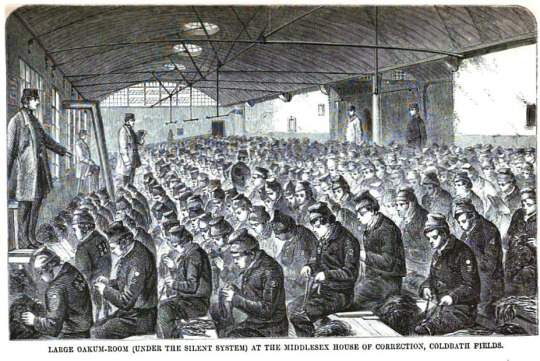
This was also done under the 'Silent System' - prisoners were banned from talking to each other.
There were in fact two classes of hard labour and also work in a trade. If you were deemed to be unfit for the first class, you could be put in the second. If for neither, you would be put in a trade.
Oscar Wilde was assigned to the second class, so picked oakum while at Wandsworth. However, even that was too much for him and he collapsed at chapel, rupturing his right eardrum and spending two months in the infirmary. Transferred to Reading, he eventually ended up in charge of distributing books to prisoners from the small prison library.
Indeed, prisoners would try anything to avoid the treadwheel, like eating soap or large quantities of salt. Collapsing at the wheel could result in serious injury or even death as you could be crushed by the still turning device unless someone spotted you.
There was no labour on Sundays or public holidays. I imagine you would spend most of your time in the cells. Something not much changed today, considering the 2021 inspection report of Wormwood Scrubs I found.
Wormwood Scrubs has in fact got a very large chapel and today it has an organ originally from a cinema in Ealing.
Hard Fare
The food was deliberately kept monotonous, but enough of it was provided to keep the prisoners alive and able to work. The main staple was gruel (hence "doing porridge") as in the workhouses or the oatmeal-based substitute stirabout. However, you would get other stuff for doing hard labour. The Victorians ate a lot more bread and potatoes then we do today for example.
A 2019 study by the University of Liverpool found that many of the 400 prisoners they looked at remained with the same BMI as they went in with - many even gained weight.
However, that was by no means the sole indication of health - prisons could easily provide vectors for infection, even if they were less overcrowded then before.
Hard Board
Prisoners had formerly slept in hammcocks - they now had hard boards to sleep on instead. They would also wear blue uniforms with broad arrows on, still something seen in cartoons.
Literature was limited - Wilde was initally limited only to the Bible and The Pilgrim's Progress. He was initially not even allowed pen and paper either.
I believe you were allowed to spend an hour in the yard each day, but this was walking in single file with again no talking.
I can imagine that even with a stove, your cell might get quite chilly in winter. Chillbains would have been common.
Rule-breaking could lead to various punishments including flogging. You might also be put solely on bread and water, a punishment still employed by the US Navy until 2019.
Summary
Wilde, who would write two books on his experience, never recovered from his prison time. He is thought to have got meningitis as a result of his fall and died in France three years after his release.
The effect of all this on offending rates was limited too - many would end doing further sentences. At least you got fed, something not guaranteed outside unless you headed for the workhouse.
The latter history of Wormwood Scrubs
However, reform had started of the system and conditions would become a good deal less harsh. The more pointless hard labour was abolished in 1902.
The First World War saw the Scrubs hold a number of conscientious objectors, who had refused even non-combat roles as they saw those as keeping the war going - when refused an exemption, they had refused to obey orders to report to barracks. Hubert W. Peet spent 112 days there and his account is now public domain:
The 'sequel' as I often call it saw Wormwood Scrubs cleared of prisoners and taken over by the War Department. MI5 spent a short time based there at the start of the war. Secretaries would often be two to a cell.
The prison returned to normal operations afterwards.
In 1966, it would see its most famous escape.
George Blake
George Blake was an SIS officer who had started working for Soviet intelligence as while imprisoned in the Korean War. He tipped off the Soviets about the tunnel the Allies would dig under the West Berlin/East Berlin border to tap military telephone lines. Being the cagey bees they were and not wanting to compromise Blake, they waited a year before 'discovering' the tunnel in a blaze of publicity. In fact, they appear to have not even made measures to restrict what the lines were used for and the West probably got some pretty good intel off it.
More seriously, Blake betrayed a large number of SIS agents to the Soviet bloc, many of whom ended up dead as a result.
Blake was arrested in 1961, ultimately made a full confession and in a private trial at the Old Bailey was sentenced to 42 years in prison; the maximum sentence for his actual offence was 14 years, but he was deemed to have committed five separate offences and some would run consecutively. This was the longest non-life sentence ever handed down in a British court.
In 1966, Blake was helped to escape by three former prisoners, two anti-nuclear campaigners and an Irish career criminal called Sean Bourke, who thought his sentence was inhuman. They also liked him. A walkie-talkie was smuggled in. During the weekly film show, Blake broke a window in his cell block, got to the perimeter wall and then climbed a rope ladder thrown over it, breaking his wrist on the way down.
Blake would eventually be smuggled out of the UK and to East Germany, along with Bourke. Blake was picked up by the KGB, taken to the USSR and remained in what become Russia until his death in 2020 aged 98, being given a funeral with military honours.
The anti-nuclear campaigners were charged with aiding his escape in 1991, claiming a moral defence. The jury, as British juries sometimes do, ignored the judge's instructions to convict them and instead declared them both not guilty. Bourke had returned to Ireland, where the Supreme Court refused to extradite him in 1973 in the grounds his crime was a political one. He would die in 1982 after collapsing walking down the road; one ex-KGB defector has claimed he was poisoned.
Penal dustbin
In 1979, IRA prisoners staged a rooftop protest over visiting rights. Then a riot over conditions, including awful toothpaste, resulted in a lot of injuries. The governor had resigned just before the riots and when the 1982 inquiry blamed the prison, he called the place a "penal dustbin".
The 1990s saw six officers convicted over brutality and large compensation payouts - the chief inspector of prisons told the place to improve or close.
Various inspection reports over the years have seen some improvements in conditions... largely as many prisoners spent most of their day in their cells.
Famous and infamous residents
Various well-known people have spent time in the Scrubs, including:
Horatio Bottomley, a newspaper mogul of the era who got seven years in 1922 for stealing money from a bonds fund.
Charles Bronson. Not the actor, but he inspired the man's use of that name.
Pete Doherty, for breaching probation, one of his several run-ins with the law over drugs use.
Lord Alfred Douglas, Wilde's lover.
Leslie Grantham, the later actor who spent ten years in prison for murdering a taxi driver during a robbery in West Germany, where he was serving in the British Army.
Timmy Murphy, a jockey convicted of indecent assault on an air stewardess.
Keith Richards of the Rolling Stones.
John Stonehouse, a former government minister who faked his death to get away from false accouting charges. Which didn't work.
Wormwood Scrubs today
Wormwood Scrubs is a Category B prison, equivalent to the US federal 'Medium Security', with five wings (the last completed in 1996) and some smaller units. It holds around 1,200 prisoners. More than it really should, common to many prisons today.
It is also a listed building and so cannot be demolished - it may well close in the near future and become a museum.
Prisoners are given a uniform, but allowed to wear some of their own clothes after a while if they behave - white and black are banned to avoid confusion with prison officers.
It also holds those on remand awaiting trial or sentence. These do not wear prison uniform.
There are now options for video calls and prisoners can have landlines in their cells to call approved numbers, although officers can of course listen in. You can even send and receive emails to those inside, although not directly.
I will leave you with the 2021 inspection report on the prison:
Anyway, Bunny would not have had a nice time of it. Especially without Raffles...
8 notes
·
View notes
Text

Sheriff Jeremiah A. Brown (November 14, 1841 – March 28, 1913) was a politician and civil rights activist in Cleveland. He worked on steamboats with Mark Twain. He moved to Cleveland, where he was elected to the Ohio House of Representatives, he played an important role in fighting Black laws, supporting education, and working for the civil rights of Ohio’s African Americans.
He was the first African American to receive a political appointment in Cuyahoga County, the first to serve as a deputy sheriff in Ohio, and the second to be elected to the Ohio state legislature.
Known as “Jere”, he was born in Pittsburgh, Pennsylvania. He was the oldest child of six children of Thomas A. and Frances J. Brown. His sister, Hallie Quinn Brown, was a noted educator and civil rights activist.
He apprenticed himself to work as a carpenter and joiner. Many employees quit when he joined the shop, unwilling to work with a Black person. He attended Avery College. The family moved to Chatham, Ontario. He married Mary A. Wheeler (1864-1904).
His first position was as bailiff of the county probate court, followed by deputy sheriff and county prison turnkey. He became clerk of the City Boards of Equalization and Revision and a letter carrier for the post office. He was involved in numerous state and national conventions of colored people.
He became a member of the Ohio State Republican Party executive committee. He was made US Customs Inspector. He was appointed clerk in the Internal Revenue Bureau, he was in charge of the office of immigrant inspector. He held several appointments including deputy in the state insurance commissioner’s office.
He was a member of the Carpenters’ and Joiners’ Union of Cleveland. He opposed segregated labor unions. He was a prominent Mason and was a Grand Master of Prince Hall Masonry. He served as a Trustee of Wilberforce University. He was a member of the Congressional Club of Cleveland. He was raised in the AME church and was a member of the Mt. Zion Congregational Church. #africanhistory365 #africanexcellence
3 notes
·
View notes
Text
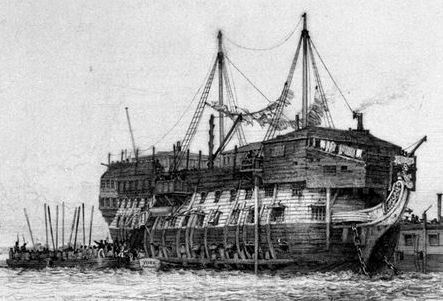
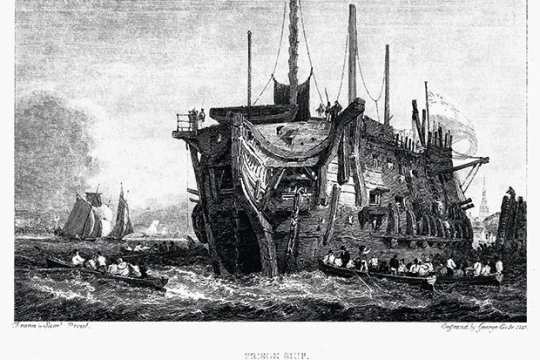
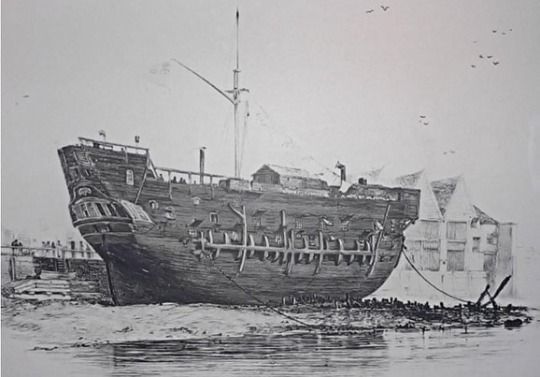
The Thames Prison Hulks. The decision to use former warships for housing prisoners, was seen as a temporary measure to ease overcrowding in jails partly due the war in the colonies, and thus an Act of Parliament in 1776 initially authorised their use for just two years. But despite rising concerns over conditions on the hulks, they eventually remained in use until 1857 in Britain and 1884 overseas, with some 8,000 convicts being housed upon them in the first 20 years alone.
The hulks were initially moored off Woolwich with the former East Indiaman Justitia and a former French Navy frigate Censor among the first. The convicts aboard them were put to use working to improve the river defences at Woolwich Arsenal and nearby docks. The hulks were also later positioned at sites including Limehouse and Deptford.
The hulks were initially operated by private companies under a government contract with little interference, but after concerns they were eventually placed under the supervision of the Inspector of Hulks in 1802. Aaron Graham was first to hold the post while his successor John Capper, who was appointed Superintendent of Prisons and the Hulk Establishment in 1814, oversaw numerous reforms of the system. During Capper’s tenure, the use of private contractors was later phased out with the government assuming direct responsibility for the hulks.
Some hulks like one positioned at Limehouse were used as receiving hulks where prisoners were initially sent for several days where they were inspected and issued clothing, blankets, and a mess kit. They were then sent to convict hulks where they were assigned to a mess and a work gang for the long-term. Other hulks were to serve specific purposes such as being a hospital hulk, there was also a hulk the Bellerophon, which was specifically designated for boys.
Conditions on board the vessels were indeed appalling and disease spread quickly with mortality rates of 30 per cent not uncommon. Prisoners were kept chained when aboard with floggings handed out as punishment for any offences. Food and clothing were of poor quality.
Despite this, the hulks continued to be seen as a convenient means of housing convicts, and in 1841 there were still more than 3,500 convicts on board hulks. It was said that one ship housed as many as 700 convicts alone.
Following several government inquiries into the hulks and the construction of more prisons on land, the hulks were gradually decommissioned. But altogether, between 1776 and 1884, the British Government had converted more than 150 ships around the country and in the colonies.
21 notes
·
View notes
Text
3 minute read
Imagine it. You’re at the end of your tether. Perhaps it’s an undiagnosed or untreated mental health problem, or maybe a financial or family disaster has pushed you to the edge. You do the unthinkable and try to end your life. The police are called, you survive. But because we do not have enough mental health beds in this country, you are sent to prison as a “place of safety” or “for your own protection”.
This is completely legal and happened to six women in three months from May to July 2022. While most of us enjoyed the warmest summer in over 10 years, they were sent to HMP Styal during one of the lowest periods in their lives. This was in addition to seven other women who were sent there solely on mental health grounds.
HMP Bronzefield, another women’s prison, was sent 75 women by the courts between 2021 and 2022, because there were not enough mental health beds in the community. That was more than double the number of women that they received the year before.
The cases above were highlighted by the Independent Monitoring Board’s (IMB) latest report on mental health concerns in women’s prisons, which came out earlier this month. But this awful phenomenon is not a new one. About a year ago, Her Majesty’s Inspectorate of Prisons reported concerns to the all party-parliamentary group (APPG) on women in the penal system.
At the time, politicians called for a change to laws that give courts the power to remand people in prison “for their own protection” under the 1976 Bail Act (meaning you can be sent to prison if you are considered a danger to yourself, which could include a suicide attempt).
And now, the the reformed Mental Health Act is set to end the use of prison as a “place of safety” too, which sometimes happens under the 1983 Mental Health Act (this law permits the authorities to put people with severe mental health needs in prison until there is space for them to be admitted to hospital).
That law change cannot come soon enough. There’s no doubt it will make all the difference for women who are not legally “guilty” of any crimes but find themselves in prison because they are mentally unwell.
From oversubscribed healthcare and specialist units at HMP Eastwood Park and HMP Bronzefield, to mentally unwell women who are segregated because the necessary support is not available, and prison staff who are struggling because they are not trained mental health professionals, the IMB report makes it clear that prisons are no place for vulnerable women who need mental health support.
However, the real question is where women with mental health needs will go if they don’t end up in our prisons. Mental health services outside prisons are also oversubscribed. Last year, an 18-year-old woman going through a mental health crisis had to wait eight-and-a-half days in A&E before she got a bed in a psychiatric hospital. Right now, 23 per cent of adults with a mental illness must wait more than three months to start treatment.
To truly break the link between mental health needs and women in prison, we must expand our mental health services on a grand scale.
More than 80 per cent of women in prison told a Justice Inspectorate Survey they had some form of mental health problem (compared with 59 per cent of men). That means people in prison without mental health problems are the minority.
Pavan Dhaliwal, the chief executive of Revolving Doors, a charity that aims to reduce reoffending said: “All evidence points to a clear solution: the end to short prison sentences and instead well-funded, trauma-informed, and personalised support in the community that addresses the root causes of crime.
“Yet, over four years after the Female Offender Strategy’s promise of fewer women entering the criminal justice system and better management of their needs in the community, the Government continues to fall short.”
Women in the prison estate are some of the most vulnerable and overlooked women in our society. I have heard first hand from a woman who had such a difficult and unstable life that prison was the first place she had any semblance of security.
I once interviewed a woman in prison with schizophrenia. When I asked her for examples of kindness she’d received from prison staff, worryingly, her best example was when a nurse had let her miss taking her medicine five times so she could get to her prison job on time.
A woman who served time in prison for murder wrote for iabout witnessing self-harm on a massive scale, and group therapy sessions that left her suicidal. She tried to take her own life during her sentence in 2016.
When asked about her experience of prison and mental health, Natalie* said: “When I was sent to prison, I spent 24 hours in a cell and found myself experiencing an anxiety attack. I rang the alarm bell six times, asking to speak to a healthcare professional, but no one came. It wasn’t until the next morning that a prison officer came to find me in my room. I was on the floor and I hadn’t gotten any sleep because of how distressed I was. Things didn’t get any better during the rest of my sentence. In fact, my mental health just spiralled, and I was in an even worse place than when I came in.
“When you’re having mental health issues before being charged, prison does nothing to help – it just turns your life upside down.”
This is the truth. Whether they are innocent or guilty, women in prison with mental health needs desperately need so much better than what is currently on offer. The question is whether our Government will do anything about it.
Natalie* is an alias
46 notes
·
View notes
Text
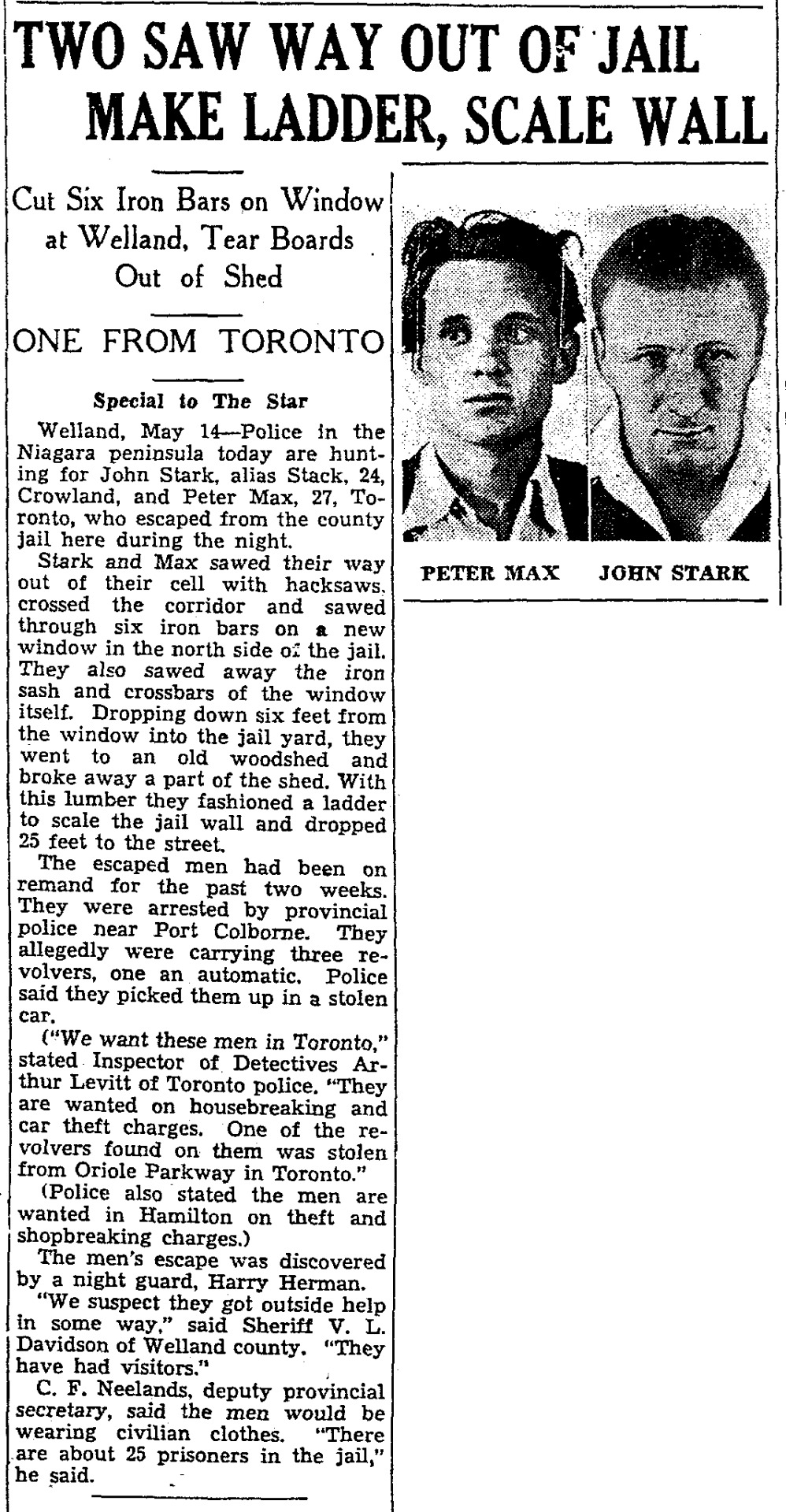
"TWO SAW WAY OUT OF JAIL MAKE LADDER, SCALE WALL," Toronto Star. May 14, 1943. Page 3. --- Cut Six Iron Bars on Window at Welland, Tear Boards Out of Shed --- ONE FROM TORONTO --- Special to The Star Welland, May 14 - Police in the Niagara peninsula today are hunting for John Stark, alias Stack, 24, Crowland, and Peter Max, 27, Toronto, who escaped from the county jail here during the night.
Stark and Max sawed their way out of their cell with hacksaws, crossed the corridor and sawed through six iron bars on a new window in the north side of the jail. They also sawed away the iron sash and crossbars of the window itself. Dropping down six feet from the window into the jail yard, they went to an old woodshed and broke away a part of the shed. With this lumber they fashioned a ladder to scale the jail wall and dropped 25 feet to the street.
The escaped men had been on remand for the past two weeks. They were arrested by provincial police near Port Colborne. They allegedly were carrying three revolvers, one an automatic. Police said they picked them up in a stolen car,
("We want these men in Toronto," stated Inspector of Detectives Arthur Levitt of Toronto police. "They are wanted on housebreaking and car theft charges. One of the revolvers found on them was stolen from Oriole Parkway in Toronto."
(Police also stated the men are wanted in Hamilton on theft and shopbreaking charges.)
The men's escape was discovered by a night guard, Harry Herman.
"We suspect they got outside help in some way," said Sheriff V. L. Davidson of Welland county. "They have had visitors."
C. F. Neelands, deputy provincial secretary, said the men would be wearing civilian clothes. "There are about 25 prisoners in the jail," he said.
#welland#hamilton#toronto#wanted fugitives#jailbreak#jailbreakers#prison break#county jail#housebreakers#car thieves#canada during world war 2#crime and punishment in canada#history of crime and punishment in canada#port colborne#armed with a revolver
2 notes
·
View notes
Text
MOTHRA Institution, The Eleven Counselors — 02, Dante Severo, the Crooked Eye Judge

"Logic is the only mercy this institution can offer."
– Dante Severo, during the trial of a collective escape attempt in the Prison Wing.
HIGH PATENT FILE – MOTHRA INSTITUTION
The Eleven Counselors — 0-2 | "Severo, the Crooked Eye Judge"
Name: Dante "Severo" Ürach
Position: Institutional Judge of MOTHRA, Counselor 0-2 of the MOTHRA Eleven Counselors
Keycard Level: Level 5
Dante Severo is the second counselor of the MOTHRA Institution's top leadership, one of the most influential and long-serving members of the High Command. Known among staff and inmates as The Judge with the Crooked Eye, his figure is easily recognized by his rigid face and highly asymmetrical stare — the result of an unexplained ocular trauma.
With a past shrouded in mystery, rumors claim he was once a judge or federal prosecutor in a Latin American country, before being invited to MOTHRA after demonstrating an unusual aptitude for handling extreme moral dilemmas without hesitation. His transition to the institution, however, is said to have involved a series of selective assassinations and a complete "erasure" of his civilian identity.
Dante Severo speaks little, observes much, and rarely expresses emotion. His gaze — with one eye almost always slightly turned to the side, even when facing someone directly — is described by inmates and guards as suffocating. Many report feeling as though he can "see inside" those who dare look him in the eyes. His demeanor is meticulous, formal, calculated, and often cruel in a methodical way. He does not engage in physical violence, but is responsible for ordering some of MOTHRA’s most brutal executions, including population cullings, silent terminations, and social confinement experiments.
Functions:
Specialty: Institutional Administrative and Judicial Control
Primary Function: He is responsible for judging all cases of deviant behavior among inmates, as well as bribery among staff. He holds the authority to sentence individuals to death or reclassify any anomaly for full containment.
Notable Cognitive Ability: Alleged photographic memory and intuitive understanding of human behavior patterns, making him an unbeatable interrogator.
Special Authorization: Can override decisions from other counselors with a double vote when invoking the “Superior Anomalous Justice” clause.
Notes:
There exists a sealed dossier regarding the incident that caused the twist in his left eye. It is believed to have occurred during an experiment with a Class E-Psychic anomaly.
He deeply distrusts Kalev, viewing him as unpredictable. He is one of the few counselors who voted against Kalev’s continued presence on the Eleven.
Always carries a broken crucifix and a leather-covered notebook filled with notes written in a personal code.
With each signed execution sentence, Dante draws a circle on one of the black tiles in his office, which is now almost completely covered in markings.
INTERNAL TRIAL – MOTHRA INSTITUTION – HEARING ROOM 03, ADMINISTRATIVE SECTOR
DATE: November 12, 2023
PRESIDED BY: Counselor 02 – Dante Ürach, “Severo”
DEFENDANT: Inspector Régis Morato, Mid-Level Security Sector
CHARGE: Bribery and facilitation of anomalous prisoner escape – Case 411-C
The room is silent. Only the echo of the guards’ boots reverberates through the steel and concrete corridors. At the center of the hearing chamber, under a pale, cold light, sits Inspector Régis, handcuffed to a metal chair. Before him, on a raised semicircular platform, are the three members of the disciplinary board. In the center, like a statue, stands Dante.
DANTE SEVERO:
(Leaning slightly, his left eye fixed on the ground, while the right remains locked on the accused)
— Inspector Morato, according to the security report, on November 4th at 2:13 a.m., you received 12,000 MOTHRA coins via encrypted transfer, in exchange for opening Gate 5 of Wing C. The gate opening coincided with the escape of anomaly 411-C. Is there anything you'd like to say before the formal hearing begins?
INSPECTOR RÉGIS:
— This is a mistake... I was coerced... there was a threat against my family...
DANTE SEVERO:
(Interrupting with a low, dry voice)
— MOTHRA does not negotiate with blackmail. Had you reported the threat, you would have received support. By remaining silent, you became complicit.
The audience of silent observers, soldiers, and two minor counselors remained motionless. Dante pulls out a file bearing his personal crest — a scale with a burning, crooked eye — and opens it, revealing documents and images.
DANTE SEVERO:
— Eyewitness 03 reports seeing you leave the monitoring room during that shift for exactly 11 minutes. During that time, access logs show your keycard activating three containment barriers. Furthermore, prisoner 411-C was seen on external cameras being guided by a figure wearing your exact uniform model.
INSPECTOR RÉGIS:
— I... had no choice!
DANTE SEVERO:
— There is always a choice. The price of the wrong choice is the certainty of consequence.
Dante rises slowly, walking to the center of the room, leaning on a silver cane. He removes a small wooden staff with engraved inscriptions. He taps the floor three times.
DANTE SEVERO:
— Inspector Régis Morato. By the powers granted to me by the Internal Council of the MOTHRA Institution, I declare you guilty of corruption, functional betrayal, and compromise of anomalous-level security. Your sentence shall be symbiotic execution — partial neural absorption into MOTHRA’s Memetic Core. Your consciousness will serve as perpetual surveillance for the benefit of those to come.
Dante turns slowly, and the soldiers advance to take Régis away, while a technician from the memetic wing prepares the integration.
DANTE SEVERO:
(Turning to the others present, adjusting his collar)
— Let this serve as an example. MOTHRA is built on silence, discipline, and sacrifice. Let that be remembered... before anyone chooses to make a mistake.
The lights shut off, bringing the trial to an end.

"Dante Severo is considered essential to the pragmatic — and certainly cruel — operation of the MOTHRA Institution. His influence is vast, his sense of justice is twisted, and his presence inspires more fear than any containment cell. His decisions are seen as absolute. And his gaze, always crooked, always angled, remains the constant reminder that within MOTHRA, right and wrong do not follow surface-world rules."
1 note
·
View note
Text
05x29 - Fools Gold
Feat: Guest appearance from Billy Murray as DI Brian Jackman from the Serious Crime Squad.
Jim practically runs into the station after Pete and Yorkie have apprehended an armed robber. Pete reminds Jim that the man is Uniform's collar and not his! The prisoner, Hill (Played by Daniel Webb) snaps that he wants to see the boss immediately. Jim tells Yorkie and Pete to take Hill to the interview room and checks the gun in with Tom.
Frank is impressed with Jim and Uniform as Hill is responsible for a number of Post Office armed robberies. Frank goes to talk to Hill as he requested but he's clammed up. Jim can't resist gloating to Hill how they caught him - he'd shot at the ceiling to intimidate customers and staff in each Post Office and it was as good as a signature now they have the gun. Hill growls that he only wants to talk to Frank and not Jim. "We're all friends here..." Frank shrugs. Hill eyes him off before claiming he wants to do a deal. Frank removes the PC who had been guarding him and Jim out of the interview room. Hill knows he can be tied to all the Post Office jobs but he has some knowledge of 'bigger jobs' that he wasn't part of but heard all about. The Post Office jobs are nothing compared to them money wise. He mentions a gold bullion robbery but won't say anything more until he knows if Frank will give him a deal.
In the canteen, Jim is moaning about Frank swanning in and taking over. Bob points out that Hill isn't even Jim's collar. "That's not the point, is it!" He protests as Pete and Yorkie join the queue. The two officers aren't happy to hear that their collar is currently 'deal-making with Frank'. "He's grassing..." Bob clarifies for Yorkie.
Frank has softened towards Steve and lighs a cigarette for him as he tells him that he wants the lowdown on the other jobs.

[He could not be more monotone when he says that!]
Hill agrees, if Frank will give him protection from the gang members. Frank stares at him so Hill starts talking. The boss, Micklewhite owns a sweatshop. The back wall of his office is false and it's where they hide the guns. He doesn't know where the cash is kept. Micklewhite's boyfriend, Paul Craig, works for a gold courier. He provided them with polaroids of the inside of the vans and other inside information. He still works for them so as not to arouse suspicion. Hill asks Frank again for the deal.
Viv has brought in a 14-year-old shoplifter who has stolen condoms from every chemist on the High St. Both she and Tom are fighting to keep straight faces. "It was the Beano and Dandy in my day." Tom states.
Frank takes Hill's information up to the Chief Inspector. Frank is keen to act on it, but Derek asks how they can be sure he's not filling him full of rubbish? Frank says Hill knows too much, they've been able to confirm that three of the men are known associates of Micklewhite and the two of them were inside together a few years back. The Serious Crimes Agency have been contacted and are sending over DI Brian Jackman. Derek agrees to move forward and give Hill a deal but he wants it all above board. He orders Tom to bail the two prisoners in the female cells and to place Hill in there alone so he's isolated from anyone else they bring in.
Hill is marched through the station by Frank with an unimpressed Pete and Yorkie following. Bob joins the procession once they reach Custody and Hill is placed into the women's cell block. Frank tells him to ring the bell if he needs anything and Sgt Penny will bring it through to him. "I'm not room service, you know." Tom frowns at Frank. "Well, that's good because you're not getting any tips."
June and Viv are complaining about every call to each estate always being up several flights of stairs. This one is the third floor. It's to visit the young lad's mum to inform her that her son has been arrested for stealing condoms! Tom takes him a sandwich, cuppa and comic in the mean time. He tells Tom that they won't get an answer from her because she'll be with her boyfriend as she has been for the last three days. She'd left him in charge of his sisters who are 4 and 6. Tom realises this means the girls are home alone and he flies out the cell to tell June and Viv. It feels like a big explanation as to why he was shoplifting condoms was removed - surely food/drink/sweets would have been a better idea? Or toys/clothing/blankets?
Viv peeps through the letterbox and calls out to the girls to ask them to open the door. She explains they're police officers and are there because Christopher asked them to come and see them. He wants them to join him at the station. The elder of the two shakes her head and tells Viv to go away.
Frank shows Ted and Jim the record of David Micklewhite. They're due to move on the sweatshop that evening. He also tells them that DI Brian Jackman is on the way. He and Ted used to be DC's together. "... Should be like old times."Frank smirks. Ted does not look happy to be meeting an old 'friend'.
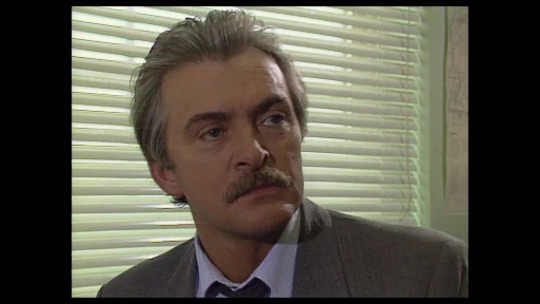
Frank sends a radio down to Hill for him to use in his cell. Tom is clearly not impressed by the special treatment he is receiving. Tom also passes him the comics he'd tried to give Christopher. "A 14-year-old kid was offered them. Thought they were a bit juvenile."
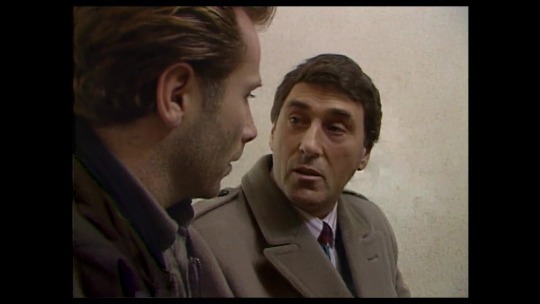
Jackman goes straight to meet Hill in his cell. Hill asks what he can get in return for helping them and Jackman says 'The usual for turning Queen's evidence." (without actually saying what that is!) Frank suggests that helping them might also help him keep his girlfriend. When he gets out they suggest he walk off into the sunset.
Jackman and his snazzy tie then head into the canteen to catch up with Ted who is not overly pleased to see him and barely says a word.
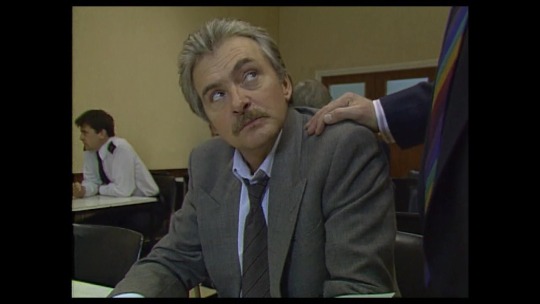

Jackman tells Ted that he didn't expect that Frank Burnside was still in the job - "not that there aren't a few people surprised by that, if you know what I mean." Ted warns him not to try it on with him as it won't get him anywhere. He walks off to the surprise of Frank who walks over and asks Jackman what happened. Jackman claims that they were good drinking friends until he was made DS over Ted. It was never the same after that, according to him.
A rather posh blonde, Janet Spencer, attends the front office, asking to speak to Frank Burnside about Steve Hill. Bob takes her name and asks her to wait whilst he tries to see if Frank knows about her visit.
Jackman lets his guard down when noone else is around to hear his phone call and tells his boss that he considers Sun Hill a Mickey Mouse outfit. He clams up when Frank appears and plays the game again. Frank tells him he can offer him 6 members of uniform and a photographer. He is clearly not buying Jackman's Mr Nice Guy act.
Taffy and Bob admire Ms Spencer and Taffy claims she's a cracker that would make him consider bigamy. Frank passes and Bob shouts over to him to get his attention before pointing Spencer out to Frank. Frank is pleased and shows her through personally.
Viv and June collect Christopher from the station and bring him - and Christine - to the flat to collect the girls. Christine is horrified to see the state of the place and the girls sat alone watching the only cartoon that it appears TPTB bought the rights to to show - Count Duckula!
Frank and Jackman lead the procession of police officers to Micklewhite's sweatshop. They burst inside and Micklewhite seems to think they're there for the workers, claiming that they're all legal 'as far as he knows'. He's concerned to hear they're there for him and that they're aware of the false wall in his office. Frank stops him from phoning anyone, and Jim brings in a sledgehammer, taking great chunks out of the wall. Micklewhite gives up any pretence and tells them Hill is the only one who knew about the wall and he's a dead man walking.
The mother of Christopher and the girls arrives at the station and demands to see her children. She claims they had no right to take the kids and she wants them back. Bob warns her that their Inspector wants a word with her.
Jim manages to break through the wall and they find several bags stuffed full of cash and guns. Jackman tells Frank he can't possibly trust Sun Hill with that amount of cash before claiming it was just a joke. Frank - alongside Ted and Jim - are not amused. "Don't start getting on my nerves Mr Jackman."
At the station, Ted and Jim are horrified that Frank is ordering them to change into shorts and t-shirts to count the money. Not only that, but Tom is going to search them before and after the search as a precaution. He assures them that he trusts them but he's not giving Jackman the opportunity to try anything on.
In CID, Jackman is on the phone urging his station to nick the rest of the gang before they hear about Micklewhite's arrest. They've already arrested his boyfriend and his sister. The boyfriend started telling them everything before he reached the station! Frank is less impressed to see Jackman ordering Yorkie to go out to collect a takeaway for Hill. Hill hands over the cash but asks him to get a receipt so he can claim it back. Yorkie looks to Frank who is unhappy but quietly tells him to do it.
Yorkie almost charges into June and apologises but explains he's annoyed because that morning he was arresting Hill for holding a sawn-off shotgun to a postmaster's head and now he's got the VIP treatment and he has to go out to get him a Chinese takeaway. [Good job he's not an officer where I live. A local joke is that they take to the roof and throw tiles for a few hours when they want a free takeaway from the police considering how often it happens.]
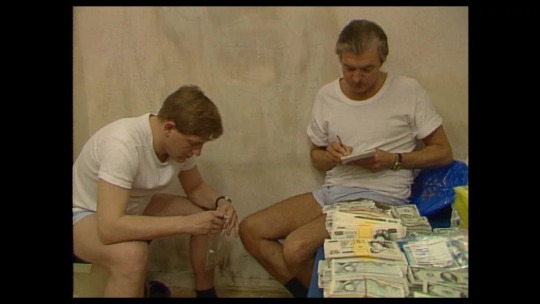
Jim and Ted finish counting the cash. There's close to 2 million pounds there. (Inflation-wise that's around £5million now) Ted tells Jim that that sort of money makes him think about never having to work again and laying on a beach somewhere hot, drinking sangria and pulling women. Jim shrugs and claims it's just like playing Monopoly to him and that he doesn't really think about it.
Outside the cell where they counted it they have to get patted down by Tom - who is also not happy about having to do it.
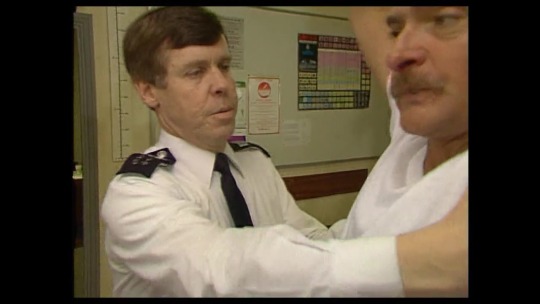
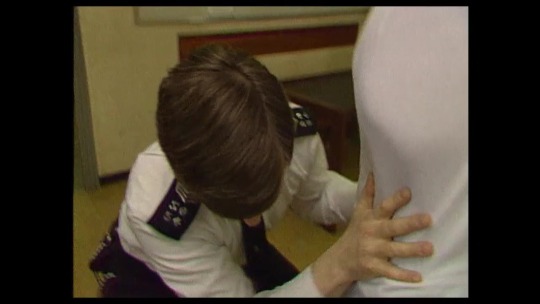

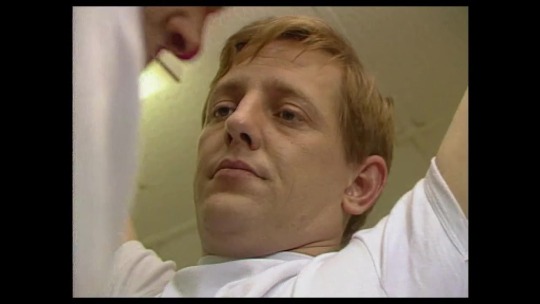
Christine goes to speak to Mrs Simpson, the mother of the three children. She tells her they've been taken into care and that she's lucky she's not going to prosecute her for leaving them. It's not the first time that Christopher has been left to look after them. She hands over the telephone number of the social worker and leaves the room, unimpressed by her sobs that she wants them back.
Yorkie returns with the takeaway for Hill. It's the first Tom has heard about it and he thinks it's out of order too. Hill's girlfriend is in the cell with him and Hill snarks about the food that Yorkie has brought which further pisses Yorkie off. Tom has to pull him away when he shouts at Hill. Jackman overhears and warns him that if he was in his station he'd have Yorkie on a charge. Frank ignores him and bollocks Hill for winding Yorkie up and tells Yorkie to remove the food and the girlfriend. Jackman reassures Hill they'll have him moved somewhere else as soon as he can okay it. Frank orders Jackman to his office.
Ted is amused to hear Jackman and Frank's raised voices approaching CID. Frank accuses him of having it all planned and Jackman admits as soon as they saw the amount of money involved that Sun Hill was not the place to hold him. Frank accuses him of being a smooth-talking user. Jackman accuses Sun Hill of being an amateur outfit, and "strictly a black and decker job." whereas he is the professional. Frank throws his coat at him and orders him out of his nick within the next hour, otherwise he'll bounce him out.
Frank catches Ted watching and the men exchange a long look. They talk about the money and he tells him it's all been counted and is currently locked in a cell awaiting collection. They both admit it would be nice for Sun Hill to get hold of the rest of the group but at least it means Jackman has to do the paperwork now. Frank admits that Ted was right about Jackman and offers to buy him a pint.
#the bill#05x29#fools gold#eric richard#bob cryer#mark wingett#jim carver#yorkie smith#tony smith#robert hudson#nick reding#pete ramsey#frank burnside#burnside#chris ellison#daniel webb#eamonn walker#malcolm haynes#taffy edwards#colin blumenau#viv martella#nula conwell#ben roberts#derek conway#barbara thorn#christine frazer#ted roach#tony scannell#june ackland#trudie goodwin
1 note
·
View note
Text
The Girls of the Glimmer Factory
Hilde Kramer Book 2
Jennifer Coburn
Sourcebooks Pub
Jan 28th, 2025
The Girls of the Glimmer Factory by Jennifer Coburn is relevant considering January 28th was Holocaust Remembrance Day. It takes place at the Theresienstadt Concentration Camp and is a novel about the importance of family, friendship, and community along with the healing power of art and music, finding one’s own strength/courage, and being able to resist, as well as a warning about the power of propaganda. The book alternates narratives between two childhood friends, Hilde and Hannah. Hilde is a true believer of the Nazi ideology while Hannah is now a Jewish prisoner at Theresienstadt. Coburn’s extensively researched narrative conveys the full horror of conditions at the camp through Hannah’s eyes, not the “show camp” that the Nazis are putting out to the world.
On background, Theresienstadt, the setting for the book, was 3.5 square miles, located in Terezin Czechoslovakia. It was a former military base, constructed in 1790, that was easily converted into a concentration camp. In its 3.5 years of existence 155,000 people passed through, 88,000 were sent to death camps in the East, 33,000 died from starvation and disease, and 34,000 survived.
This book along with the first book, Cradles of the Reich, are compelling, powerful, intense, captivating, and informative. With antisemitism going on in today’s world both are must reads.
Elise Cooper: Why do you think the Nazis created the concentration camp, Theresienstadt?
Jennifer Coburn: I came across examples of Nazi propaganda that included posters, films, and even board games. After the Nazis codified the Final Solution of killing the Jews they knew the world would start to ask questions. They understood they needed somewhere to bring the Red Cross and other humanitarian organizations to fool them that the Jews were living well in Nazi Europe. I wanted to set a story that tells about this Camp, including the resilience of those imprisoned there.
EC: What do you think Theresienstadt represented?
JC: The diabolical nature of the Nazis and the experts they were with propaganda. It worked.
EC: Why do you think the Nazi propaganda worked?
JC: When the Red Cross came there on June 23, 1944, they had three inspectors with eight Nazi representatives as their tour guides. The camp was beautified: importing 1200 plants and flowers, the building of a musical pavilion and playground, as well as prisoner housing converted to a coffee house. As the Red Cross was leaving, the lead inspector supposedly told the Nazi Commandant, ‘your Jews are living better here than anywhere else in Europe right now, and we do not need to inspect Auschwitz,’ which was the Nazi death camp.
EC: Do you think the Red Cross had tunnel vision and wore masks over their heads?
JC: They were complicit. They gave the Nazis a nine-month lead time where they were able to clean up the buildings and transport the sickest prisoners, 7500, to Auschwitz days before the inspection. They even put healthy bodies into hospital beds to show they were not that sick.
EC: Can you explain your book quote, “hope is a Nazi accomplice”?
JC: This quote was in the memoir Daughter of Auschwitz by Tova Friedman. She pointed out how the Nazis told the Jews, as they were entering the gas chamber, that they were only going to take a shower. This kind of “hope” calmed people. After reading this I decided to explore the different roles of hope in the lives of these prisoners. Is it something that is a salvation, or does it placate people to not fight back, or is it both?
EC: Did the character Hilde represent those Germans who looked the other way or always say “I did not know anything about it”?
JC: She did not know that Jewish people were people exterminated. This was hard for me to grapple with because I did not want her to be an excuse for Nazi deniability. Remember her husband says to her, ‘If you did not know, you did not want to know.’ She is a representation of the German people who were active participants in the Nazi movement. I wanted to show how many were born pure hearted and were told that Jews were the enemy with a slow descent into madness.
EC: How would you describe Hilde?
JC: An idealogue, naïve, self-centered, loyal, and a malignant narcissist. Someone who was starved for attention and adulation. She craved the acceptance from the outside. She was one of the characters in Cradles of the Reich, the first book. She did have misgivings when witnessing Kristallnacht but decides that the others going along with it must know better. She slowly begins to buy into the antisemitism.
EC: How would you describe the heroine, Hannah?
JC: Loyal to her grandfather, anxious, and does what is necessary to survive. She did not want to go to Theresienstadt and wanted to hide instead. She sacrificed herself to go along with her grandfather who decided to go to Theresienstadt. Remember at that time she did not have much of a choice because she was brought up not to be in direct defiance of her grandfather.
EC: Does the grandfather represent those Jews that tried to fool themselves, someone with blinders on?
JC: The grandfather was based on Phillip Manes, the author of the book As If It Were Life. I found myself frustrated with him because I knew had the story will end, a Monday Morning QB. He talked about how he refused to look at the time in Theresienstadt as an imprisonment. He never spoke with anger or resentment. His diary stops mid-sentence because he was sent to Auschwitz and did not survive the war.
EC: What was the relationship between Hilde and Hannah?
JC: The were best friends as children. Hilde is a true believer. She wanted to save Hannah not because she realized the persecution and annihilation was wrong. Nope. Her saving of Hannah was a selfish choice because she was only willing to save her, not others. She looked upon Hannah as basically a term called ‘Pet Jew, a true saying.” She did not want to save Hannah as a human being. While Hannah felt she made her choice and told her, ‘I don’t need a savior, I need friends, and you ceased to be one the day you joined the Nazi Party.’
EC: Does the character Misa represent those Jews who resisted?
JC: Yes. She was tough, realistic, brave, manipulative, considerate, and caring.
EC: How would you describe Radek?
JC: Kind, strong, confidant, encouraging, and courageous.
EC: Was the baby smuggling operation true?
JC: Yes. BTW: Irma, the nurse from Cradles of the Reich, and her husband Rolfe make a cameo appearance because they are involved in the baby smuggling operation. This really took place in Prague not in Theresienstadt.
EC: Were fake documentaries really made by the Nazis?
JC: There were three attempts in all. The first film was done by Irena Dodalov in 1942 who made it too realistic for the Nazis and rejected by Himmler. The second film was made by Hans Gunther in January 1944. They gave up after a day because there was so much suffering. In June 1944, after the Red Cross inspection, using all the beautification made for the Red Cross, they made a propaganda film.
EC: Did the Jewish director of the last film, Kurt Gernon, represent those Jews who sold out?
JC: Some thought that, but others thought he was such an egotistical artist that he could not help himself. Others thought he was more subversive and did help Jews. The Mourner’s Kaddish in the film was made up by me to show how the Jews there undermined the film.
EC: Was the escape from the trains heading to Auschwitz true?
JC: Between 700 and 800 escaped from trains in transport. What weakened was the connection between the bolts and wood, which is how they removed the bars and escaped. But I changed the setting because the trains from France had the bolts on the inside of the cattle car, but the trains from the East had bolts on the outside.
EC: Next book?
JC: It will probably come out in 2027. The working title is the Greenwich Village Fiancé. It is about a beard, a fake girlfriend, Angela, for gay men in the 1950s there. At that time, it was very dangerous to be openly gay. A very important character is Jewish. A note to my readers, there will be a Jewish wedding attended by Shel, the brother of Leo, the hero in Cradles of the Reich. Also attending is Gundi, but spoiler alert, Leo the Jewish resistance boyfriend of Gundi, did not survive.
THANK YOU!!
0 notes
Text
Events 10.31 (after 1950)
1956 – Suez Crisis: The United Kingdom and France begin bombing Egypt to force the reopening of the Suez Canal. 1956 – Hungarian Revolution of 1956: A Revolutionary Headquarters is established in Hungary. Following Imre Nagy's announcement of October 30, banned non-Communist political parties are reformed, and the MDP is replaced by the MSZMP. József Mindszenty is released from prison. The Soviet Politburo makes the decision to crush the Revolution. 1961 – In the Soviet Union, Joseph Stalin's body is removed from Lenin's Mausoleum, also known as the Lenin Tomb. 1963 – Indiana State Fairgrounds Coliseum gas explosion: A gas explosion at the Indiana State Fairgrounds Coliseum in Indianapolis kills 81 people and injures another 400 during an ice show. 1968 – Vietnam War October surprise: Citing progress with the Paris peace talks, US President Lyndon B. Johnson announces to the nation that he has ordered a complete cessation of "all air, naval, and artillery bombardment of North Vietnam" effective November 1. 1973 – Mountjoy Prison helicopter escape. Three Provisional Irish Republican Army members escape from Mountjoy Prison, Dublin aboard a hijacked helicopter that landed in the exercise yard. 1979 – Western Airlines Flight 2605 crashes on landing in Mexico City, killing 73 people. 1984 – Indian Prime Minister Indira Gandhi is assassinated by two Sikh security guards. Riots break out in New Delhi and other cities and around 3,000 Sikhs are killed. 1994 – American Eagle Flight 4184 crashes near Roselawn, Indiana killing all 68 people on board. 1996 – TAM Transportes Aéreos Regionais Flight 402 crashes in São Paulo, Brazil, killing 99 people. 1998 – Iraq disarmament crisis begins: Iraq announces it would no longer cooperate with United Nations weapons inspectors. 1999 – Yachtsman Jesse Martin returns to Melbourne after 11 months of circumnavigating the world, solo, non-stop and unassisted. 1999 – EgyptAir Flight 990 crashes into the Atlantic Ocean near Nantucket, killing all 217 people on board. 2000 – Soyuz TM-31 launches, carrying the first resident crew to the International Space Station. The ISS has been crewed continuously since then. 2000 – Singapore Airlines Flight 006 crashes on takeoff from Taipei, killing 83. 2002 – A federal grand jury in Houston, Texas indicts former Enron chief financial officer Andrew Fastow on 78 counts of wire fraud, money laundering, conspiracy and obstruction of justice related to the collapse of his ex-employer. 2003 – Mahathir Mohamad resigns as Prime Minister of Malaysia and is replaced by Deputy Prime Minister Abdullah Ahmad Badawi, marking an end to Mahathir's 22 years in power. 2011 – The global population of humans reaches seven billion. This day is now recognized by the United Nations as the Day of Seven Billion. 2014 – During a test flight, the VSS Enterprise, a Virgin Galactic experimental spaceflight test vehicle, suffers a catastrophic in-flight breakup and crashes in the Mojave Desert, California. 2015 – Metrojet Flight 9268 is bombed over the northern Sinai Peninsula, killing all 224 people on board. 2017 – A truck drives into a crowd in Lower Manhattan, New York City, killing eight people. 2020 – Berlin Brandenburg Airport opens its doors after nearly 10 years of delays due to construction issues and project corruption.
0 notes